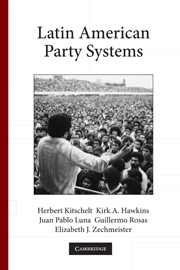Book contents
- Frontmatter
- Contents
- List of Tables
- List of Figures
- Preface
- Introduction: Party Competition in Latin America
- 1 Patterns of Programmatic Party Competition in Latin America
- PART I DESCRIBING PROGRAMMATIC STRUCTURATION
- Part II CAUSES AND CORRELATES OF PROGRAMMATIC PARTY SYSTEM STRUCTURATION: EXPLAINING CROSS-NATIONAL DIVERSITY
- Appendix A Description of Variables, Data Issues, and Research Design
- Appendix B List of Variables
- Appendix C English Translation of Relevant Portions of the Salamanca Survey
- Bibliography
- Index
- Titles in the Series
1 - Patterns of Programmatic Party Competition in Latin America
Published online by Cambridge University Press: 05 June 2012
- Frontmatter
- Contents
- List of Tables
- List of Figures
- Preface
- Introduction: Party Competition in Latin America
- 1 Patterns of Programmatic Party Competition in Latin America
- PART I DESCRIBING PROGRAMMATIC STRUCTURATION
- Part II CAUSES AND CORRELATES OF PROGRAMMATIC PARTY SYSTEM STRUCTURATION: EXPLAINING CROSS-NATIONAL DIVERSITY
- Appendix A Description of Variables, Data Issues, and Research Design
- Appendix B List of Variables
- Appendix C English Translation of Relevant Portions of the Salamanca Survey
- Bibliography
- Index
- Titles in the Series
Summary
Most democracies have a representative format such that citizens as “principals” entrust politicians as “agents” with the business of making binding, authoritative decisions for all members of the polity. Democracy is a political regime that specifies formal procedures of political participation and electoral contestation, together with guarantees of civil and political rights and basic resource endowments, that allow citizens to engage in this process effectively and without constraint. Through periodic elections, agents are held accountable to the mass public. In anticipation of such accountability, agents may be responsive to the principals' demands and preferences. There is plenty of debate about this normative and positive characterization of such “first principles” of democratic contestation (cf. Collier and Levitsky 1997; Held 1987; Dahl 1989; Shapiro 2003), but in this study we are concerned with the more specific question of how democratic polities express circuits of accountability and responsiveness in light of their existing institutions and the nature of the political actors who inhabit them. Even more specifically, our study examines how political parties – as collective actors involved in the process of interest articulation and aggregation – affect the positive quality of democracy by shaping circuits of accountability and responsiveness in Latin American polities.
In populous democratic polities, political parties – as coalitions of ambitious, office-seeking politicians – may be indispensable elements of any political process that organizes circuits of accountability and responsiveness.
- Type
- Chapter
- Information
- Latin American Party Systems , pp. 14 - 58Publisher: Cambridge University PressPrint publication year: 2010
- 3
- Cited by

